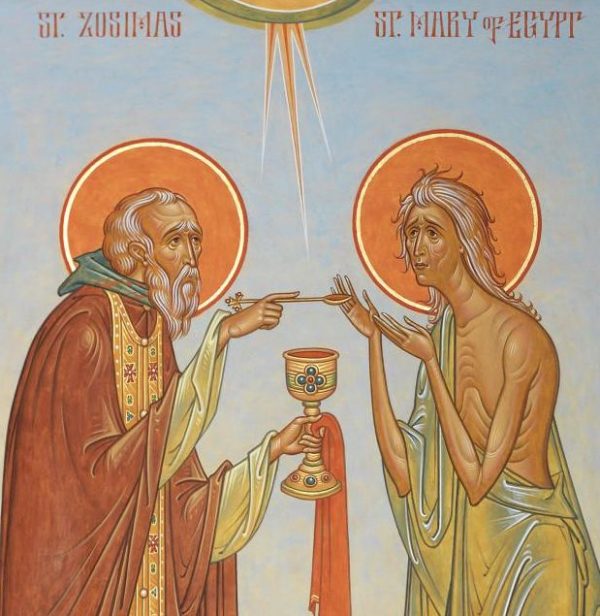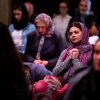Anyone outside the Orthodox Church would be shocked to discover that the saint we discuss the most during Great Lent – the one whose life takes one whole hour to be read aloud in the Church every year – was a teenager who worked the streets of Alexandria in Egypt.
Her goal wasn’t just to live a wild, sinful life: her goal was to drag down with her as many other people as possible. The life of Saint Mary of Egypt was beyond sinful – it was evil.
The reason the Church pays so much attention to her during Lent – the reason we have a Sunday dedicated to her today – is the fact that she spent 47 years of her life repenting, and turning back to God.
There is hope for everyone, brothers and sisters. Turning back to God is the key.
We are in the middle of a great crisis right now – the greatest crisis we have seen in a generation.
We are not used to it, but the natural state of this fallen world is to be in a crisis.
When we are in communion with God, the whole human race experiences peace, and harmony, and health. When we are far away from God, everything falls apart.
The Church sets aside one Sunday every year to teach us that our hope for forgiveness from God, our hope to change our lives, our hope to change our families – our hope to change the world – starts with repentance.
Repentance isn’t a feeling, or a plan: it’s a personal choice to follow the commandments of God to change our life, step by step, bit by bit, from now until we die.
That’s just what Saint Mary of Egypt did.
Only one person – the Elder Zosimas – ever met Saint Mary after she went out into the desert. He is the one who brought back her story to us.
What did Elder Zosimas see?
Saint Mary of Egypt left the city to fulfil a vow she made, given to her by the Mother of God, to go into the desert to repent. If she did that, she was told that she would find peace in her heart.
In the desert, she wanted to go back to her old ways. She craved the old music. She craved wine. She craved pleasures of the flesh. By the time Elder Zosimas met her, she had been struggling with her passions for forty seven years.
How many of us would struggle that long?
Wouldn’t most people today just give up?
Wouldn’t most people simply never try in the first place? Why repent?
Saint Mary of Egypt wasn’t facing a crisis in her times. The first thing she asks Elder Zosimas is, “Tell me, father, how are the Christian people living? And the kings? How is the Church guided?”
Father Zosimas replies, “By your prayers, mother, Christ has granted lasting peace to all.”
This is not today – this is not the world we are living in. In the midst of a world crisis, no world leader has called on the Church to pray for deliverance. No world leader has called on the Church to make an appeal to God. And no world leader – imagine it – has called on people to come before God in repentance, and to ask His mercy.
The saints and the Scriptures do not teach that sickness is a punishment when we do bad things: God doesn’t work like that. But if we move away from God, we turn our backs on God. Then we experience the consequences of those choices. It’s like choosing to place our hand on a hot stove – we need to have the humility to run to God if we want His help.
In the Gospel, we hear about a sinful woman, who repents, and comes to anoint the feet of the Lord. Saint Ambrose of Milan tells us that only a humble person can do that – a proud, self-absorbed person won’t even bother.
That is where much of our world is today: self-absorbed.
Brothers and sisters: do not wait until you experience suffering before you turn to God.
Do not wait until someone is sick, or until someone is dying to start praying from your heart every day.
Do not wait until North America experiences the catastrophe of other countries, so that your heart can become humble enough to turn to God for His help.
Some people have suggested that Saint Mary of Egypt should be a model of how Church life should look in a time of crisis – only she didn’t live in a time of crisis.
In most ways, we are quite unlike Saint Mary of Egypt.
We cannot mystically see the secret lives of other people like she did with Elder Zosimas.
We don’t levitate in the air when we pray.
We don’t know the words of the Bible without ever having read it.
Saint Mary only ever received Holy Communion twice in her life – once just before she went into the desert, and once just before she died, forty seven years later.
It would be misleading to say that her life is in general a model for living through the crisis of our times.
But in one way – the most important way – the life of Saint Mary of Egypt is exactly the life we need to follow.
It’s a life of repentance that brings us back to God.
It is the only life that will bring us healing. It is the only life that can bring us hope.
And it is the life we need to live right now.
Not in a month. Not in a week. And not tomorrow. Start today.
– Archpriest Geoffrey Korz is a parish priest in Hamilton, Canada.
You can follow Pravmir.com on Twitter, Facebook, Instagram, Telegram, or Parler

















